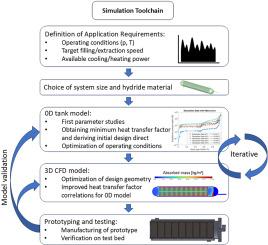开发金属氢化物存储系统的仿真工具链
IF 8.3
2区 工程技术
Q1 CHEMISTRY, PHYSICAL
引用次数: 0
摘要
为了促进氢在能源转型中的作用,需要高效的氢储存。金属氢化物(MH)储氢具有较高的体积存储密度和接近环境条件的操作能力,是目前广泛使用的压缩气体和液体存储的一种有前途的替代方案。然而,为了实现快速填充和提取时间,需要有效的热管理。这可能导致较高的设计复杂性和成本。在这项工作中,开发了用于加氢模拟的零(0D)和三维(3D)计算流体动力学(CFD)罐模型,并进行了实验验证,以评估和比较不同的热管理设计。利用二维模型和三维模型之间的协同作用,提出了一种新的金属氢化物罐设计仿真工具链。所提出的方法有利于快速的早期设计研究,利用0D模型在详细的3D研究之前预先选择储罐设计。这有助于储罐开发人员根据给定的应用要求选择最具成本效益的设计。本文章由计算机程序翻译,如有差异,请以英文原文为准。

Simulation toolchain for the development of metal hydride storage systems
To facilitate the role of hydrogen in the energy transition, efficient hydrogen storage is required. By offering high volumetric storage densities and operation near ambient conditions, hydrogen storage in metal hydrides (MH) is a promising alternative to currently more widely used compressed gaseous and liquid storage. However, to achieve fast filling and extraction times, efficient thermal management is required. This can lead to high design complexity and costs. In this work, zero- (0D) and three-dimensional (3D) computational fluid dynamics (CFD) tank models for hydrogen filling simulations are developed and experimentally validated in order to evaluate and compare different thermal management designs. By utilizing the synergies between the 0D and 3D models, a novel simulation toolchain for designing metal hydride tanks is proposed. The presented methodology is advantageous for rapid early design studies leveraging the 0D model to pre-select tank designs prior to detailed 3D investigations. This aids tank developers to select the most cost-effective design for given application requirements.
求助全文
通过发布文献求助,成功后即可免费获取论文全文。
去求助
来源期刊

International Journal of Hydrogen Energy
工程技术-环境科学
CiteScore
13.50
自引率
25.00%
发文量
3502
审稿时长
60 days
期刊介绍:
The objective of the International Journal of Hydrogen Energy is to facilitate the exchange of new ideas, technological advancements, and research findings in the field of Hydrogen Energy among scientists and engineers worldwide. This journal showcases original research, both analytical and experimental, covering various aspects of Hydrogen Energy. These include production, storage, transmission, utilization, enabling technologies, environmental impact, economic considerations, and global perspectives on hydrogen and its carriers such as NH3, CH4, alcohols, etc.
The utilization aspect encompasses various methods such as thermochemical (combustion), photochemical, electrochemical (fuel cells), and nuclear conversion of hydrogen, hydrogen isotopes, and hydrogen carriers into thermal, mechanical, and electrical energies. The applications of these energies can be found in transportation (including aerospace), industrial, commercial, and residential sectors.
 求助内容:
求助内容: 应助结果提醒方式:
应助结果提醒方式:


